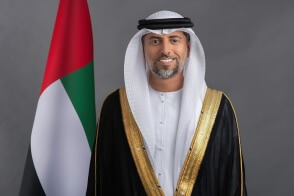UAE Remarkable Progress in Clean Energy and Green Transition
His Excellency Suhail bin Mohammed Faraj Faris Al Mazrouei, the Minister of Energy and Infrastructure, recently highlighted the significant contribution of clean energy projects to the UAE's energy mix in 2022. These projects accounted for approximately 15.6% of the country's energy portfolio. Moreover, the UAE has set ambitious goals to achieve 30% clean energy integration by 2030, as part of its strategy to modernize the nation's energy landscape by 2050.
During the ADIPEC 2023 conference and exhibition in Abu Dhabi, Suhail Al Mazrouei stated that the UAE has secured the second position globally in the Green Future Index for 2023, indicating the country's strong commitment to energy transition. This index evaluates 76 countries and regions based on their ability to develop a sustainable, low-carbon future through investments in renewable energy, innovation, and green policies, among other criteria.
The Green Future Index measures countries across several key dimensions, including carbon emissions, the speed of transition to clean energy, green society, clean innovation, and climate policy. The UAE's rapid transition to clean and sustainable energy sources serves as a compelling example of a nation achieving remarkable progress in this vital sector.
Addressing the current oil price outlook, Minister Suhail Al Mazrouei emphasized that oil prices are influenced by market dynamics, primarily supply and demand. He noted that OPEC+ is working to balance the market, especially in response to the challenges posed by insufficient investments in various energy sectors worldwide.
Suhail Al Mazrouei highlighted the need for increased investments in all forms of energy and encouraged international companies to contribute to global energy security. The production capacity of OPEC+ countries has decreased by 4 million barrels of oil between 2020 and 2023, underscoring the urgency of bolstering investments in this crucial sector.
Discussing the role of the UAE's energy sector in the upcoming COP28 conference, Minister Suhail Al Mazrouei stressed the sector's pivotal role in ensuring the success of COP28, which the UAE is hosting this year. The UAE remains committed to reducing carbon emissions and achieving climate neutrality by 2050. Achieving this objective requires a substantial contribution from the energy sector, as outlined in the UAE's updated 2050 Energy Strategy, which aims for carbon neutrality in the electricity and water sectors by 2050.
Suhail Al Mazrouei emphasized the importance of investing in sustainable energy and diversifying energy sources, citing substantial investments in clean energy projects such as solar, hydrogen, nuclear, hydroelectric, and more. Over the past 15 years, the UAE has invested more than $40 billion in clean energy initiatives. National investments in this regard are projected to range between 150 and 200 billion dirhams by 2030 to ensure energy demand satisfaction and sustainable economic growth.
The UAE aims to achieve one of the lowest emission factors in the region, approximately 0.27 kg of carbon dioxide per kWh by 2030. Furthermore, the UAE has committed to tripling its renewable energy contribution by 2030 as part of the 2050 UAE Energy Strategy update. The country has taken significant steps to reduce emissions in the energy sector, redirecting resources toward renewable energy technology research and development and forging international partnerships to strengthen clean energy capabilities. Additionally, public awareness campaigns have been launched to engage society in the green energy transition, alongside infrastructure enhancements to accommodate renewable energy requirements.



